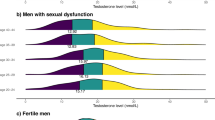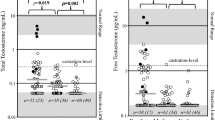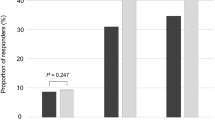Abstract
A retrospective study was performed to evaluate how the prostate-specific antigen (PSA) response to testosterone replacement therapy (TRT) varies with age, mode of testosterone treatment, and baseline levels of PSA and testosterone. In total, 48 consecutive hypogonadal men who completed 1 year of TRT were evaluated. All men had a negative prostate biopsy obtained prior to initiating TRT. Men received TRT in the form of intramuscular injections (n=33) or topical gel (n=25) based on clinical response. Comparisons in the change in PSA after 1 year of TRT were made based on various thresholds for age and baseline values of PSA, total testosterone (TT), and free testosterone (FT). Baseline levels of TT (297.7±156.6 vs 292.7±89.7 ng/dl; P=0.88) and FT (0.95±0.3 vs 1.1±0.3 ng/dl; P=0.08) were similar for the injection and transdermal groups, and both groups also had similar baseline PSA values (1.92±1.9 vs 1.71±1.9 ng/ml, respectively; P=0.67). After 1 year of TRT, mean PSA values did not differ significantly between groups, nor did the mean increase in PSA (P>0.05). The overall mean increase in PSA was 0.31±0.76 ng/ml. After one year of TRT, PSA was decreased in 21%, unchanged in 22%, and increased in 57%. Only 24% of the entire group demonstrated a PSA increase of 0.5 ng/ml or greater. No statistical difference was found in the change in PSA based on patient age, baseline PSA levels, or baseline levels of TT or FT. TRT causes only a mild increase in PSA in most hypogonadal men, and does not appear to be influenced by the mode of TRT, age, or baseline levels of PSA or testosterone.
This is a preview of subscription content, access via your institution
Access options
Subscribe to this journal
Receive 12 print issues and online access
$259.00 per year
only $21.58 per issue
Buy this article
- Purchase on SpringerLink
- Instant access to full article PDF
Prices may be subject to local taxes which are calculated during checkout

Similar content being viewed by others
References
Snyder PJ, Peachey H, Berlin JA, Hannoush P, Haddad G, Dlewati A et al. Effects of testosterone replacement in hypogonadal men. J Clin Endocrinol Metab 2000; 85 (80): 2670–2677.
Sih R, Morley JE, Kaiser FE, Perry HM, Patrick P, Ross C . Testosterone replacement in older hypogonadal men: a 12-month randomized controlled trial. J Clin Endocrinol Metab 1997; 82 (6): 1661–1667.
Snyder PJ, Peachey H, Berlin JA, Rader D, Usher D, Loh L et al. Effects of transdermal testosterone treatment on serum lipid and apolipoprotein levels in men more than 65 years of age. Am J Med 2001; 111 (4): 255–260.
Kenny AM, Prestwood KM, Gruman CA, Marcello KM, Raisz LG . Effects of transdermal testosterone on bone and muscle in older men with low bioavailable testosterone levels. J Gerontol A Biol Sci Med Sci 2001; 56: M266–M272.
Dobs AS, Meikle AW, Arver S, Sanders SW, Caramelli KE, Mazer NA . Pharmacokinetics, efficacy, and safety of a permeation-enhanced testosterone transdermal system in comparison with bi-weekly injections of testosterone enanthate for the treatment of hypogonadal men. J Clin Endocrinol Metab 1999; 84 (10): 3469–3478.
Snyder PJ, Peachey H, Hannoush P, Berlin JA, Loh L, Holmes JH et al. Effect of testosterone treatment on bone mineral density in men over 65 years of age. J Clin Endocrinol Metab 1999; 84 (6): 1966–1972.
Tenover JS . Effects of testosterone supplementation in aging male. J Clin Endocrinol Metab 1992; 75: 1092–1098.
Curran MJ, Bihrle W . Dramatic rise in prostate-specific antigen after androgen replacement in a hypogonadal man with occult adenocarcinoma of the prostate. Urology 1999; 53 (2): 423–424.
Loughlin KR, Richie JP . Prostate cancer after exogenous testosterone treatment for impotence. J Urol 1997; 157 (5): 1845.
Hajjar RR, Kaiser FE, Morley JE . Outcomes of long-term testosterone replacement in hypogondal males: a retrospective analysis. J Clin Endocrinol Metab 1997; 82 (11): 3793–3796.
Svetec DA, Canby ED, Thompson IM, Sabanegh ES . The effect of parenteral testosterone replacement on prostate specific antigen in hypogonadal men with erectile dysfunction. J Urol 1997; 158 (5): 1775–1777.
Guay AT, Perez JB, Fitaihi WA, Vereb M . Testosterone treatment in hypogondal men: prostate-specific antigen levels and risk of prostate cancer. Endocrine Practice 2000; 6 (2): 132–138.
Wang C, Swerdloff RS, Iranmanesh A, Dobs A, Snyder PJ, Cunningham G et al. Transdermal testosterone gel improves sexual function, mood, mucsle strength, and body composition parameters in hypogondal men. J Clin Endocrinol Metab 2000; 85 (6): 2839–2853.
Gerstenbluth RE, Maniam PN, Corty EW, Seftel AD . Prostate-specific antigen in hypogondal men treated with testosterone replacement. J Androl 2002; 23 (6): 922–926.
Carter HB, Pearson JD, Metter EJ, Chan DW, Andres R, Fozard JL et al. Longitudinal evaluation of serum androgen levels in men with and without prostate cancer. Prostate 1995; 27 (1): 25–31.
Oesterling JE, Jacobsen SJ, Chute CG, Guess HÁ, Guirman CJ, Panser LA et al. Serum prostate-specific antigen in a community-based population of healthy men. Establishment of age-specific references ranges. JAMA 1993; 270 (7): 860–864.
Rhoden EL, Morgentaler A . Risks of testosterone-replacement therapy and recommendations for monitoring. N Engl J Med 2004; 350 (5): 482–492.
Bhasin S, Singh AB, Mac RP, Carter B, Lee MI, Cunningham GR . Managing the risks of prostate disease during testosterone replacement therapy in older men: recommendations for a standardized monitoring plan. J Androl 2003; 24 (3): 299–311.
Rhoden EL, Morgentaler A . Testosterone replacement therapy in hypogonadal men at high risk for prostate cancer: results of 1 year of treatment in men with prostatic intraepithelial neoplasia. J Urol 2003; 170 (6): 2348–2351.
Acknowledgements
We acknowledge the support for Dr Rhoden by CAPES of Brazil and Conselho Nacional de Pesquisa (CNPq) Brazil.
Author information
Authors and Affiliations
Corresponding author
Rights and permissions
About this article
Cite this article
Rhoden, E., Morgentaler, A. Influence of demographic factors and biochemical characteristics on the prostate-specific antigen (PSA) response to testosterone replacement therapy. Int J Impot Res 18, 201–205 (2006). https://doi.org/10.1038/sj.ijir.3901394
Received:
Revised:
Accepted:
Published:
Issue Date:
DOI: https://doi.org/10.1038/sj.ijir.3901394
Keywords
This article is cited by
-
A stage-dependent link between metabolic syndrome components and incident prostate cancer
Nature Reviews Urology (2018)
-
Testosterone Replacement Therapy and Prostate Health
Current Urology Reports (2012)
-
Testosterone therapy in hypogonadal men and potential prostate cancer risk: a systematic review
International Journal of Impotence Research (2009)
-
Partial androgen deficiency, depression and testosterone treatment in aging men
Aging Clinical and Experimental Research (2009)
-
Correlation between simultaneous PSA and serum testosterone concentrations among eugonadal, untreated hypogonadal and hypogonadal men receiving testosterone replacement therapy
International Journal of Impotence Research (2008)



